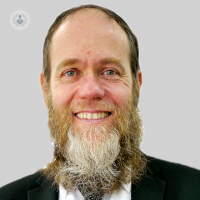Can a chalazion affect vision?
Written in association with:In this article below, esteemed consultant ophthalmologist, Mr Myer Mark Yodaiken, discusses chalazions at length, including what they are, as well as an outlining of the associated symptoms and treatment options.
What is a chalazion, and what causes it?
A chalazion, otherwise known as a meibomian gland cyst, is a small, raised, red lump that appears on the eyelid. Chalazions are typically caused by underlying meibomian gland dysfunction/blepharitis which is why people can get recurring chalazia.
How does a chalazion differ from a stye (or hordeolum)?
A chalazion is a blocked meibomian gland which swells and can sometimes become infected, leading to even more swelling and discomfort. A stye, on the other hand, is usually an infection at the base of the eyelash or near to the eyelash and can be uncomfortable or painful.

What are the common symptoms of a chalazion?
An uninfected chalazion is not generally painful, and it is actually the cosmetic impact which makes patients seek help. It can, however, become quite sore if there is infection or a lot of inflammation, and depending on the size and location, a chalazion can also affect your vision by pressing on the cornea.
What are the available treatments for managing a chalazion?
Treatment depends on whether there is simply a cyst or if the cyst is infected. Many chalazions will go away by themselves within a month or so without treatment. If they don’t, it’s important to seek specialist treatment, as an untreated chalazion can make you more likely to develop cellulitis around the eye (preseptal cellulitis).
Other treatment options include a steroid (Kenalog) injection to the cyst. If the steroid injection isn't enough, or if the chalazion is particularly big or long-standing, incision and curettage surgery will be needed.
Can a chalazion affect vision?
If a chalazion gets big enough to press on the eyeball, it can cause blurred vision due to the effects of direct contact with the cornea. This risk is significantly increased by a chalazion that is greater than 5 mm in size. If the blocked gland makes the surface of the eye become dry (due to lack of oil) vision can also get blurred due to the imperfect tear film.
If you wish to book an appointment with Mr Myer Mark Yodaiken today, you can do just that via his Top Doctors profile.


